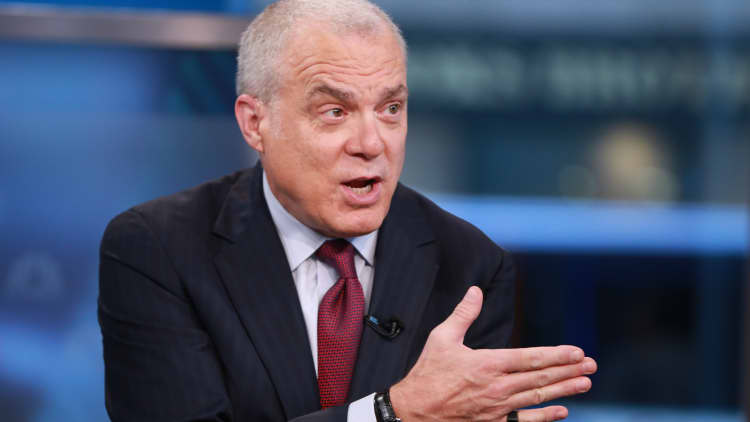
Aetna's CEO Mark Bertolini doesn't want to charge some people more for Obamacare — but he does want the government to step up and fund the program "appropriately."
Bertolini on Tuesday rejected a suggestion that Republican proposals to allow insurers to charge people with pre-existing health conditions more for Obamacare plans could prompt Aetna to return in force to individual plan marketplaces.
Instead, Bertolini said on CNBC's "Closing Bell," the federal government should guarantee financial support for insurers who participate in the program, which in turn could maintain and expand health coverage for many people.
Specifically, Bertolini said the government should fund programs that protect insurers financially when they have high-cost patients and that lower out-of-pocket health expenses for low-income customers.
"I don't think it's a matter of raising premiums on people with pre-existing conditions," said Bertolini, whose company went from selling Obamacare plans in 15 states last year to selling them in just four this year after citing big financial losses on individual health plans.
"I think people with pre-existing conditions, people under the age of 26, should get insurance. Anybody who applies should get insurance," he said.
"I think the biggest program with the [Affordable Care Act] is how it is funded," Bertolini said. "If it were funded correctly, all these people could get coverage."
"If it's just funded on the premium basis without reinsurance, if cost-sharing reductions don't show up after September, none of it works," he said.
Most Obamacare customers receive subsidies that lower the cost, often sharply, of their monthly premiums below retail prices, because they have low or moderate incomes.
Reinsurance is the subsidization by the government of insurers who find themselves covering customers with high health costs. Obamacare's reinsurance program ran only from 2014 through 2016, and the Republican-controlled Congress has barred the government from paying insurers the entire amount they are owed for another Obamacare cost-reduction program, known as risk corridors.
Cost-sharing reductions are subsidies offered to low-income Obamacare customers that reduce how much they have to pay in copayments, coinsurance and deductibles when they obtain health services. Insurers are responsible for issuing those reductions but then are supposed to be reimbursed for their cost by the federal government.
The Trump administration has given conflicting signals about whether it will continue to authorize the payments of CSRs to insurers, and House Republican leaders have proposed ending CSRs permanently as part of their Obamacare replacement bill.
Bertolini, talking about those Obamacare subsidies on Tuesday, said there is "a set of interconnected financial relationships that need to exist in order to support a market like this."
"Currently, as structured," Bertolini said, even if Republicans agree to continue to fund the cost-sharing reduction program through September, it "is not enough to get people engaged in the exchanges again."
Aetna announced several weeks ago that it would not sell individual health plans on Iowa's Obamacare market in 2018.
Bertolini said Tuesday the company is evaluating which, if any, of the remaining three states — Delaware, Nebraska and Virginia — it will remain in next year for Obamacare plans.
"We expect to lose around $200 million, $220 million this year on the exchanges, with only a quarter of the membership we had last year," Bertolini said. "So we're evaluating the markets as we speak."
"We will be notifying some other states shortly. We only have four states remaining, so our presence will be smaller than it is this year."


